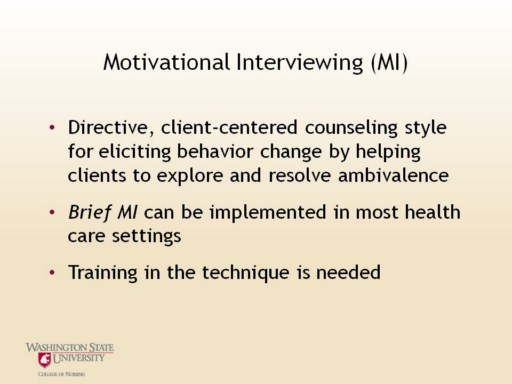| front |1 |2 |3 |4 |5 |6 |7 |8 |9 |10 |11 |12 |13 |14 |15 |16 |17 |18 |19 |20 |21 |22 |23 |review |
 |
While the 5A’s and the CDSMP are extremely useful for patient who welcome the opportunity to participate in self-management, motivational interviewing (MI) can be an important technique to increase self-management participation from patients who are demonstrate less engagement or express a desire to change their behavior, but never seem able to do so.
According to Saha, we engage in a particular behavior based on our assessment of the pros and cons of that behavior. Ambivalence is the unresolved conflict between the pros and cons and leads to continued engagement in the current behavior. As a result persistent ambivalence is the principle impediment to change.
In contrast, new behaviors can be facilitated through MI by resolving conflict or ambivalence about changing from one behavior, to the new behavior.
Health care professionals should receive training, which can be obtained in short workshops, prior to attempting motivational interviewing. Following appropriate training, Brief MI can be implemented in most health care settings. However, referring patients to a counselor or psychologist for MI is also an appropriate for providing self-management support.
There are many methods or techniques for motivational interviewing (MI), and while important, Rollnick & Miller (1995) advise that the spirit of the interview is at least as important as implementing the appropriate technique. They suggest the following points capture the assumptions and spirit of motivational interviewing:
•
Collaboration
•Evocation
•Autonomy
These descriptors, clearly show how MI can be congruent with self-management support and patient-centered care which is central to the care delivery using the Chronic Care Model as a framework.
•
Reference: Rollnick, S., & Miller, (1995). What is MI? Behavioral and Cognitive Psychotherapy, 23, 325-334. Available at: http://www.motivationalinterview.org/clinical/whatismi.html
Saha, P. Motivational Intervention: Aproaching Behavior Change. Available at http://www.google.com/search?q=motivational+interviewing&hl=en&prmd=ibv&ei=sMknTM_ |